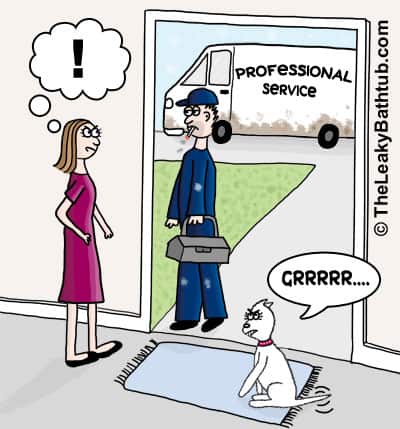
There’s one word that bugs me like no other in business copy. It’s the most unnecessary, superfluous, dumb word possible. When I see it being used (which is often), I don’t know whether to snort with laughter or snort with tears. It makes me wonder which genius thought that that would be a good word to use in a business description.
And what is this abomination of a word?
The word that I loathe so much is… “professional”.
You see this word all the time; there’s no getting away from it. For example, I saw it signwritten on an electrician’s van when I was driving on the motorway the other day: it had “professional service” written underneath the company’s logo.
“Professional service”… as opposed to what? An unprofessional service? Or an amateurish service?!
The fact that you’re professional should be a given!
Surely, by its very meaning, the fact that you’re in business should signal that you’re a “professional”!
Yet we all moan about the cowboys in our industry; the people who give our trade a bad name; the people who rip off clients.
No siree, we want to let everyone know that we’re better than those sorts of goons!
We all pride ourselves on being professionals in our industry
While we may be professional in our core trade, are we professional in all aspects of our business? What does it actually mean to be professional in business?
Let’s have a quick brainstorm on what it means to be professional:
- Answering the phone in a friendly, helpful manner – and passing on messages.
- Responding promptly and courteously to phone and email enquiries.
- Correct spelling and punctuation in all our company communications: emails, website content, blog posts, estimates, invoices, signage, newsletters, social media updates, and so on.
- Keeping our uniforms, vehicles and premises clean and tidy.
- Invoicing promptly and following up promptly for any late payments.
- Keeping customers updated as to the cost, so that they don’t receive any nasty surprises when they receive your invoice.
- Honouring any warranty or guarantee claims in a fair way, and going out of your way to ensure that the customer is happy.
- Taking any complaints seriously, and resolving them. That means putting the immediate issue right (e.g. giving the customer a refund), as well as solving the root of the problem (e.g. identifying the flaw in your manufacturing or quality control process).
- Giving sincere thanks to the customer for their business, and also to strategic alliance partners who have referred clients to you.
- If you’re given a referral, keeping the referee updated with the progress, so that they’re assured that their client is in good, capable hands.
- Ensuring that your website is up-to-date.
- Regular blog updates.
- Regular newsletters (be it quarterly, monthly, fortnightly, weekly, or whatever you choose).
- Regular social media updates (be it weekly, twice weekly, or whatever you choose).
- Completing work and meeting all deadlines, on time, every time.
- Treating your staff fairly. That means having systems in place for job descriptions, performance reviews, training, promotion, remuneration, and so on.
- Good financial management, including regular reporting and analysis as well as goal setting and budgeting.
- Having a marketing plan documented, and sharing it with your team so that everyone knows the direction that the company is moving towards.
How does your business score against that checklist?
Can you confidently say that you do all of these professional things, all the time? Or are there a few gaps?
You may think this doesn’t matter…
You may think that as long as you’re a great electrician (or whatever you do), these little things don’t matter. But they matter very much to your customers.
After all, your customers probably aren’t experts in your industry. If you’re an electrician, your average client probably doesn’t know very much about wiring. So instead, they’ll judge the quality of your work based on the things they do know about.
Therefore an electrician who’s tidily attired in a neat uniform and who cleans up any mess he makes, will be perceived as being more professional than a scruffy electrician with greasy hair, and a crumpled uniform who leaves a mess behind.
Summary
Instead of resorting to words to explain that your business is “professional”, remember that actions speak louder than words.
If you demonstrate that you’re professional in every single aspect of your business, it’ll do a lot more for your business than slapping the word “professional” on your vehicle’s sign writing. Or on your website. Or in your printed brochures.
PS. The only place where the word “professional” is permissible is in your Testimonials. It’s OK for your customers to say that you’re professional, but it’s not OK for you to say it. Yeah, double standards, I know, but that’s the way it is. 😉



